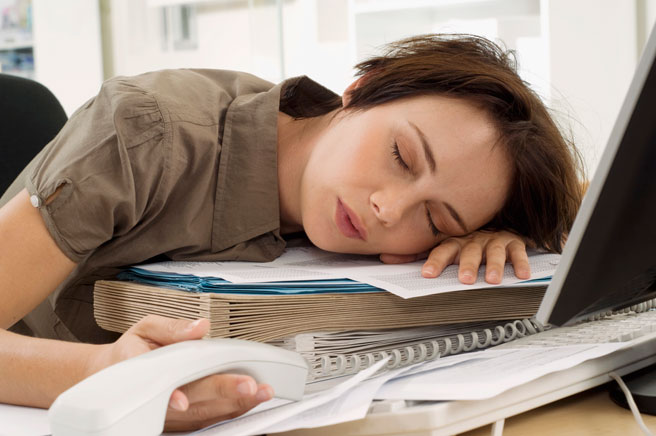10 ways to leave work energised
What do you do with your evenings? See friends, spend time with your kids, hit the gym or cinema? If the answer is none of those things because you’re just too tired, you need to start energising your work day so you spring rather than slump out of the office come 5pm. Here’s how to do it. By Helen Foster

1. Remember what you love about your job. You’re never going to feel fulfilled and energised at the end of your working day if you hate what’s gone on in the previous eight hours. But you don’t necessarily need to feel happier and less drained at work. According to studies at Canada’s University of Alberta, you simply need to find the purpose in what you do – whether it’s benefiting your life, or that of others. Every day, think about whom you might help with your job each day (no matter how tenuously), then focus on what it allows you personally to achieve, and finally highlight any good points that occur. The more you do this three-step exercise, the happier and more energised you’ll become.
2. Open a window. There are two reasons for this: it cools things down (Japanese research has shown we get fatigued at work when temperatures hit 28°C or above), but it also reduces carbon dioxide build-up, something experts link particularly to afternoon fatigue ‘as carbon dioxide tends to build up over the day if ventilation is poor', says Richard Barry from indoor air quality specialists AirisQ. If you’re in a sealed office, add plants. They absorb carbon dioxide — and other environmental pollutants — that can trigger fatigue. ‘And they tend to make people feel more positive and energised,’ says Barry.
3. Sit up straight. If you sit slumped all day, then as well as reducing the amount of energising oxygen you’re taking in, you put your muscles under fatigue-inducing extra pressure. ‘Sitting slumped actually makes you feel less positive, which in turn increases your feelings of fatigue,’ says physiotherapist Sammy Margo. She advises sitting upright in your chair as if someone is very gently trying to pull you out of it.
4. Do a 5pm task audit. According to Dr Mary Ann Bauman, author of 'Fight Fatigue: Six Simple Steps To Maximise Your Energy’, unfinished tasks are major energy stealers. Leave work with lots of these hanging over your head and they’ll keep draining you at home, too. ‘But if at the end of the day you sit for a few minutes and focus on what you have completed, and have a few ideas on how to complete tomorrow’s tasks you’ll leave work feeling satisfied, accomplished — and energised,’ she says.
5. Makeover your monitor. If your eyes are tired at the end of the day, you will you be, too, which is why Iain Anderson, president of The Eyecare Trust, suggests tweaking your computer as a key energy booster. ‘Printed words are dense and well defined, but characters on a screen are brightest at the centre and lose their intensity towards the edges, which means our eyes have to work harder to maintain focus,’ he explains. That alone is tiring but a badly set up monitor can worsen things. Make the words easier to see by selecting a font size of 12 points or above. Then move your monitor so it’s 33 to 59cm from your eyes and place the centre of the screen 10 to 15cm below your natural eye level. Finally, give it a clean — the dirtier the screen, the harder it is to focus on.
6. Get a blue light. Researchers at the University of Surrey recently found that people who swapped normal white light bulbs for blue-tinged ones (which are closer to the type of light emitted from the sun) felt less sleepy throughout the day. ‘Blue light stimulates part of the brain called the melanopsin receptor, which then triggers activity in parts of the brain associated with alertness,’ says Dr Derk-Jan Dijk, who worked on the trial. If you can’t get your boss to change the whole office, buy a blue-toned or natural daylight bulb from a hardware shop and put it in a desk lamp to get a good-for-you glow.
7. Drink licorice tea. Our adrenal glands produce motivating hormones that rev us up each day — they fire up first thing in the morning, and slow down as bedtime approaches. But if they’re overworked, this slow-down occurs mid afternoon, triggering after-lunch fatigue and evening apathy. To test if this is affecting you, stand in a dark room, and ask a friend to shine a torch to the side of your eyes and look at your pupils. ‘If they pulsate instead of shrinking it’s a sign of adrenal problems,’ says nutritionist Alli Godbold. Reducing stress is key to reversing things, but in the meantime she suggests adding licorice tea to your office regime as it helps support the adrenal glands.
8. Sip some water after each phone call. If you spend a lot of your day on the phone, dehydration could be behind your energy loss, says US stress management company TMI, which has identified phone fatigue as a major issue for call centre workers. As we speak, we lose moisture from our mouth. The more dehydrated we get, the more our blood starts to thicken, reducing the amount of energy-giving oxygen in our system. If you’ve got a heavy phone day, take a sip of water after each call.
9. Measure your waist. In a trial by the Institute of Occupational Medicine at the National Taiwan University, women who had waist measurements of more than 31.5in were nearly twice as likely to be tired after work than slimmer women. It may sound like a strange link, but Dr Marilyn Glenville, author of 'Fat Around The Middle’, explains that both are caused by the same thing — ‘the release of too many stress hormones’, specifically cortisol, which causes the laying down of abdominal fat, and adrenalin. This gets you through the day at work but in the evening when stress stops, energy crashes. Controlling stress also controls energy.
10. Eat the right lunch. If your energy starts to flag around 3pm, and brings sugar cravings with it, dietitian Nigel Denby suggests your lunch could be to blame. ‘A meal that is too high in refined carbohydrates, such as a white-bread sandwich and crisps, will cause energy swings that leave you tired a few hours later,’ he says. Switch to low-GI carbs such as wholegrain breads or oatcakes, then focus on nutrient balance. It’s been found that people who eat balanced diets have 10 times more energy than those who cut food groups, says Denby, so, serve yourself a palm-sized portion of protein, a fist-sized serving of low-GI carbs and lots of fruit or vegetables. Two to three hours later, have a snack of a low-GI carbs and a little protein. ‘Eating regularly keeps energy levels up,’ he says.








